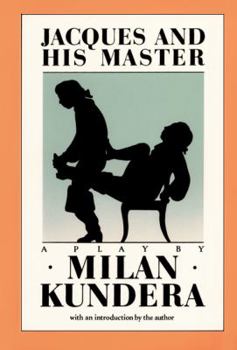Jacques and His Master: An Homage to Diderot in Three Acts
Select Format
Select Condition 
Book Overview
A deliciously witty and entertaining "variation" on Diderot's novel Jacques le Fatalist, written for Milan Kundera's "private pleasure" in the aftermath of the Russian invasion of Czechoslovakia.When... This description may be from another edition of this product.
Format:Paperback
Language:English
ISBN:0060912227
ISBN13:9780060912222
Release Date:January 1994
Publisher:Harpperen
Length:90 Pages
Weight:0.25 lbs.
Dimensions:0.3" x 5.0" x 7.9"
Customer Reviews
2 ratings
SUPERIOR THEATER FOR THE HEAD, NOT THE HEART
Published by Thriftbooks.com User , 15 years ago
Jacques and His Servant is a dramatic variation on the famous eighteenth-century novel by Denis Diderot, Jacques the Fatalist. The original, Jacques the Fatalist, is arguably the most radical and one of the most subversive books in the history of western literature. The theater has not had the equal of Jacques in subversiveness, or in disregard for classical form, although some of the plays of Beckett (Endgame, for instance, or Waiting for Godot or Happy Days) might qualify, and so might Alfred Jarry's blasphemous Ubu Roi. Kundera's play is a variation on the original, not an adaptation of it. As the author notes in his introductory essay, an adaptation reduces its original, where a variation takes inspiration from it. Thus this play does not replicate the novel; it takes flight from it, the best form of homage. Jacques's is the anti-unity story par excellence: there is neither unity of place nor time nor narrative thrust, and the characters depicted in it, though real enough for the play's purpose, are neither realistic nor in any way sentimental. They talk about ideas as much as about feelings, and the narrative stream is constantly interrupted by digressions, interruptions and side-stories. Jacques is the least prudish of novels: this play carries that tradition forward: the dialogue is often bawdy, at times outright scurrilous. It is interesting: reading the dialogue in Diderot's novel, one is amused but not shocked but reading similar dialogue in Kundera's play, and knowing it is meant to be read aloud for an audience of others, the words shock in their bluntness and their earthiness. Jacques's repeated bragging about how he has cuckolded his best friend, for instance, and his master's acceptance of Jacques's boasting, seems raw even in the light of today's relaxed mores. It's not that we don't do these things, but we don't talk about them as dispassionately as Jacques and his master do. Plot is pretty much irrelevant to this play, as it was to the novel it came from. As much as there is a story line, it isn't linear but it relates three separate instances of lechery, which turn out to be variations on the same theme. The subtexts are philosophical and literary, and resolutely intellectual -anti-emotional: first, that what happens (= is written) in the world, happens (this is fatalism); second, that we constantly relive (= re-edit) our lives, so life's meaning and import changes with time. The play ends with the master asking Jacques to tell him where they should head next. Jacques objects: how can he lead the way if neither of them knows where they are going. The master insists and Jacques says, "all right then ... forward." The master asks which direction is forward. "Let me tell you a great secret," says Jacques, "One of mankind's oldest tricks. Forward is anywhere." And that is Kundera's (and Diderot's as well) last bit of wisdom for his audience as the master and Jacques stumble off the stage. **
Kundera's first (and only) play
Published by Thriftbooks.com User , 24 years ago
Milan Kundera always called himself a novelist. He makes a fine distinction between writers and novelists. He thinks that his poems and his play (this play) are a peripheral part of his work. However, this work is important for Kundera. It is a variation of one of his most favourite novels: Diderot's "Jacques Le Fatalist". Kundera admires 18th century novel and this is one of its most finest examples. First American performance of this play was directed by Susan Sontag. Also, it is interesting that the preface for this play spured the famous polemics on Dostoyevsky between Kundera and Joseph Brodski.





